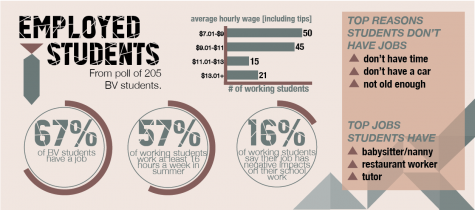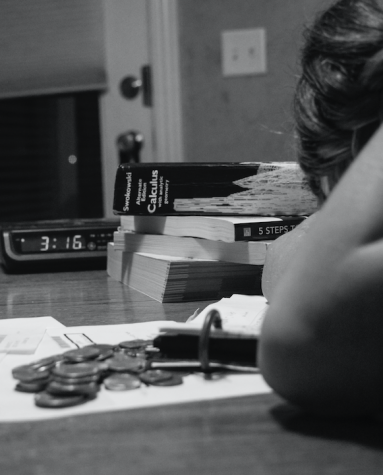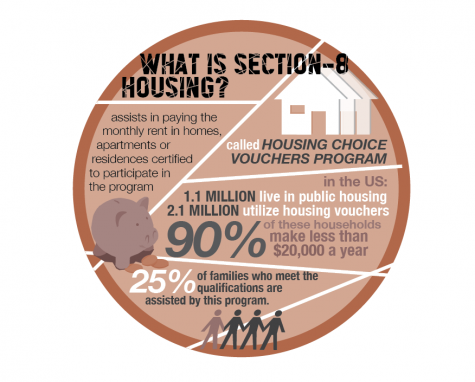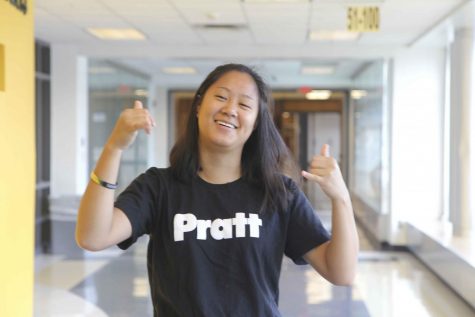Working Class
Students balance school and work to support family, gain financial stability
The median household income in 2014 in the United States was approximately $50,000. In Johnson County, the median household income was about $74,000 in 2012, according to the U.S. Census Bureau and jocogov.org.
Sometimes, as Blue Valley students living in one of the richest counties of Kansas — and furthermore, a wealthier area of the United States — it can be difficult to remember there are people in the community who don’t have the luxury to be financially carefree.
These people are friends, co-workers, teachers and family — The Tiger Print believes it is important that students step out of their own personal worlds and listen to the stories of other community members, especially if they lead very different lives.
FOR THE FUTURE
 Out of the BV students who have jobs, 16 percent work more than 16 hours a week during the school year.
Out of the BV students who have jobs, 16 percent work more than 16 hours a week during the school year.
BV senior Natalie Outlaw is a gymnastics coach at Blue Valley Recreation. She works around 20 hours a week during the school year. In the summer, she works additional jobs, like babysitting, to get her closer to 45-hour weeks.
“I started working [when I was 12] because my parents didn’t really have a lot of money,” Outlaw said. “My two older sisters were in college, my mom had just had a fifth kid and money was tight. They didn’t really have money for school clothes or anything that wasn’t essential.”
She said her parents did not pressure her to get a job, but she wanted to relieve them of some of their stress.
“When I got my first job, I didn’t make a ton, but I made enough to pay for my own clothes and things like that,” she said. “Now, I have a car, so I pay for my gas and insurance every month. [I pay for] my clothes and all of the fees associated with color guard. Aside from that, my parents don’t have anything saved up for my college, so I’m trying to save a little each month for that as well.”
When it comes to grades and school, Outlaw said she stays on top of it because she knows scholarship money will help her on her way to college.
My two older sisters were in college, my mom had just had a fifth kid and money was tight. They didn’t really have money for school clothes or anything that wasn’t essential.
“I try to keep up a 4.0 at least by semester marks,” she said. “Usually, that means I’m running on very little sleep on days that I have both guard practice and work because I’ll have a couple hours of homework on top of that.”
However, Outlaw said her social life suffers the most.
“[It] just doesn’t exist for these first few months of school,” she said. “Long weekends and breaks like Thanksgiving and winter are really the [only] time I have for my friends and boyfriend.”
As far as life outside of high school goes, she said she tries to not let money be a determining factor for her decisions.
“I know if I really want something, I can make it work,” Outlaw said. “It’s good for the future because I want to be a middle school teacher, and they have to make due with a salary that’s not exactly ‘living large.’”
 For college, Outlaw said she is relying on scholarships and loans.
For college, Outlaw said she is relying on scholarships and loans.
“I didn’t want to stay in Kansas for school, so I looked at a few colleges I was interested in and made sure I could qualify for in-state tuition before I applied,” she said. “My dad is trying to help me out by redirecting some of what he would have paid to child support and giving it to me for college, so I am really grateful for that.”
Outlaw’s plans for the future include attending Missouri State University and earning a Bachelors degree in middle school education with a double focus in language arts and math.
“I am a huge grammar nerd, so ideally, I’ll get to teach English,” she said. “However, as a woman going into teaching, choosing a STEM field is extremely marketable and might help me out with money in the future.”
Five percent of BV students who are employed work to support their families, including a BV junior who works as a hostess for 14 hours on the weekends. During the weekdays, she works a total of six hours at different part-time jobs.
“At first, it wasn’t necessary for me to work,” she said. “My family’s financial situation was stable. It was around last year when I really had to take more hours and different part-time jobs.”
The junior said she gives approximately 80 percent of what she makes to her parents while 20 percent goes to her college funds or personal needs. She said she doesn’t generally like working, but it is necessary for her family’s financial situation.
“At first, I did enjoy it,” she said. “But [with] every job you have, there are always going to be things that bring you down. I like the aspect that I get to meet different people, [but] I hate that I can’t work [for enjoyment] — I work for stability. It makes me feel like I’m an adult already — and we’re still kids.”
The student works around 20 hours a week during the school year and 31 hours during the summer. She chose not to disclose the amount she makes at work but said she makes enough to support herself and her family. However, she also said that her work has an affect on both her social life and student life.
“My weekends are usually full,” she said. “I have a few hours I can spend time with friends, which sometimes works out. Student-wise — it’s awful. I have tests I can’t study for and homework I can’t do. I can’t focus because I get home late sometimes.”
She said the decisions she makes about her future are influenced by her need to work.
I hate that I can’t work [for enjoyment] — I work for stability. It makes me feel like I’m an adult already — and we’re still kids.
“It definitely has impacted my [desire] to be in pre-med,” she said. “There’s a lot of bills you have to pay. It all evens out when you finish, but if you can’t even [get] the degree, then what’s the point?”
The junior said her first priority when it comes to work is her family, and they are a factor in what she will end up doing in her life.
“I think of my family first, [but] I would love to be able to get through pre-med,” she said. “If my family is struggling, I can’t just leave them. Right now, I just want to get my family back on their feet.”
 A TEACHER’S PERSPECTIVE
A TEACHER’S PERSPECTIVE
English teacher Rebecca Knueven has both observed as a teacher and experienced as a student the effects of working during school.
Knueven said when she was in high school, she had to have a job to pay for her personal bills as well.
“I was never given lunch money [or] money for clothing,” she said. “I never had a car until college, and I paid cash for it. My working, even though I was still a full-time athlete almost year-round, was because I had to afford my necessities.”
She said she thinks this is why she relates so much to students who work until late at night.
If they’re working from 4 to 10, and they get home at 10:30, it may not matter how great their time management skills are if they just physically don’t have the time.
“Mine was not to the extent that putting food on the table for dinner was an issue, but there were some times I didn’t have my lunch money, and I just wouldn’t have lunch,” Knueven said. “I’ve seen that, and it’s not a fun situation to be in.”
When it comes to the repercussions that working can have on a student, Knueven said she has observed both positive and negative impacts.
“For some students, it forces them to actually budget their time accordingly,” she said. “[For others,] if they’re working from 4 to 10, and they get home at 10:30, it may not matter how great their time management skills are if they just physically don’t have the time. That’s one of the big struggles I’ve seen with kids who have to work.”
As a teacher, Knueven said she makes exceptions if she is aware of the student’s circumstances.
“I know I have had students every year who are working from the moment they leave school and at night and sometimes on the weekends,” Knueven said. “If I am aware of the situation, I always make accommodations for those students as far as homework and assignments go.”
Even though the students attend the same school, Knueven said many times, people can go unaware of others’ plights.
 “Because so many of our students [don’t need to work], they don’t see that we have students that need to work to pay bills,” she said. “They may know that some have to work, but they don’t fully realize the extent because they’ve just never experienced it themselves, and so they’ve never been exposed to it. We have kids that don’t even know what Section-8 housing is and the fact that we have [it] in Overland Park.”
“Because so many of our students [don’t need to work], they don’t see that we have students that need to work to pay bills,” she said. “They may know that some have to work, but they don’t fully realize the extent because they’ve just never experienced it themselves, and so they’ve never been exposed to it. We have kids that don’t even know what Section-8 housing is and the fact that we have [it] in Overland Park.”
Despite this lack of knowledge, Knueven said that as a community, we can begin to understand more if we create an open conversation.
“[It] is hard because I know from my personal experience, I never would have shared in class that my parents basically had financially cut me off the second I was 16,” she said. “But I think that depending on what class it is, [or] if you’re in certains groups like DECA, where economics is a discussion, we can foster dialogue.”

Julie is the co-editor in chief of "The Tiger Print" and has been on staff for three years. She writes features, news and opinion stories and also takes...

Kaitlin Yu is co-editor in chief of “The Tiger Print.” She appreciates the arts, loves cats and dogs and takes pleasure in wasting her time away by...

Alli Williams is a co-editor in chief for “The Tiger Print.” She works as an assistant teacher at a math tutoring business. Her favorite part of journalism...

Melanie White is a photographer for “The Tiger Print.” She loves photography, and enjoys riding horses in her free time. This year Melanie plans to...



